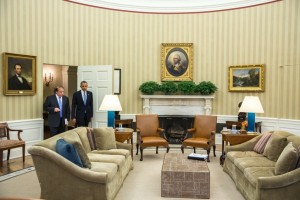Why Would Woodward Leak Confirmation of US-Pak Collaboration on Drone Strikes While Sharif Was in DC?
Obama and Sharif enter the Oval Office yesterday.
On the same day that Pakistan’s newly elected Prime Minister, Nawaz Sharif, spoke to the press alongside US President Barack Obama in Washington, Bob Woodward teamed with Greg Miller to release confirmation that Pakistan’s government has agreed to and collaborated in choosing targets for the US “secret” drone program inside Pakistan. Participation by Pakistan, and especially its military, has long been known by close observers and the regular insistence by Pakistan’s government that drone strikes are a violation of Pakistan’s sovereignty is viewed cynically as the government’s need to provide domestic political cover.
On first thought, the timing of this revelation seems to break the basic tenets of what Marcy describes as the Bob Woodward Law that applies to classified information being leaked to Woodward:
As explained by John Rizzo in the context of the Obama Administration’s leaks to Bob Woodward, they can and do insta-declassify stuff for their own political purposes all the time. They can do it to make the President look important; they can do it to lie us into an illegal war; they can do it to ruin the career of someone who might expose the earlier lies.
The timing of this leak seems to be aimed more at embarrassing Obama than making him look important. The description of the joint appearance by the New York Times is quite interesting if one assumes that Sharif and Obama were aware that the leak was about to be published:
But Mr. Sharif said after the meeting that he had asked Mr. Obama to halt American drone strikes in Pakistan, broaching an issue that has aggravated tensions. The president did not respond publicly, saying only that the two sides needed to find ways to fight terrorism “that respect Pakistan’s sovereignty, that respect the concerns of both countries.”
So Obama would not address the drone issue directly in his public remarks. But it seems that Sharif was not particularly enthusiastic in his obligatory public denouncement of drone strikes: Read more →

